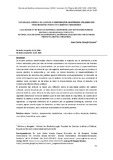Mostrar el registro sencillo del ítem
Naturaleza jurídica del cadáver o componentes anatómicos utilizado con fines docentes: perspectiva bioética y biojurídica
| dc.rights.license | http://creativecommons.org/licenses/by-nc-sa/3.0/ve/ | es_VE |
| dc.contributor.author | Araujo Cuauro, Juan Carlos | |
| dc.date.accessioned | 2019-11-12T15:09:08Z | |
| dc.date.available | 2019-11-12T15:09:08Z | |
| dc.date.issued | 2019-11 | |
| dc.identifier.issn | 2244-7482 | |
| dc.identifier.uri | http://www.saber.ula.ve/handle/123456789/46229 | |
| dc.description.abstract | La muerte produce determinados efectos relacionados la mayoría con el patrimonio y otros menos conocidos, pero por ello no menos importantes con la propia esencia del ser humano los llamados derechos de la personalidad. Las personas tienen derechos y responsabilidades mientras están vivas en virtud de que son agentes autónomos pero una vez que se produce el deceso pierden la autonomía y, por ende, no tienen derechos ni responsabilidades. El conocimiento de derechos del cadáver genera diferentes pronunciamientos, la discusión se divide entre aquellos que consideran que el cadáver no los tiene y entre los que consideran al cadáver como portador de derechos es decir la trascendencia que ofrece el derecho a la muerte y los efectos éticos jurídicos El propósito del artículo es hacer una reflexión sobre la naturaleza jurídica del cadáver utilizado para la docencia, por un lado, desde lo ético se establece una especie de transición entre la bioética, como ética de la vida, hacia una necroética, que considera las relaciones de dignidad póstuma en torno al cadáver y por el otro lado desde lo biojurídico, en cuanto así el cadáver es objeto o sujeto de derecho o es un bien o una cosa, análisis desde la doctrina y la legislación. La dignidad intrínseca de la persona por su igualdad ontológica; posterior a su muerte, siguen siendo sujeto de derechos, es decir que las personas conservan sus derechos después de la muerte, así lo reconoce la sociedad y el derecho positivo. | es_VE |
| dc.language.iso | es | es_VE |
| dc.publisher | SaberULA | es_VE |
| dc.rights | info:eu-repo/semantics/openAccess | es_VE |
| dc.subject | Cadáver | es_VE |
| dc.subject | Componentes anatómicos | es_VE |
| dc.subject | Naturaleza jurídica docencia | es_VE |
| dc.subject | Bioética | es_VE |
| dc.subject | Necroética | es_VE |
| dc.subject | Biojurídica | es_VE |
| dc.subject | Cosa | es_VE |
| dc.subject | Sujeto | es_VE |
| dc.title | Naturaleza jurídica del cadáver o componentes anatómicos utilizado con fines docentes: perspectiva bioética y biojurídica | es_VE |
| dc.title.alternative | Legal nature of the body or anatomical components used for teaching purposes: bioethical and biojuridical perspective. | es_VE |
| dc.title.alternative | Natureza legal do corpo ou componentes anatômicos utilizados para fins de ensino: perspectiva bioética e biojurídica. | es_VE |
| dc.type | info:eu-repo/semantics/article | es_VE |
| dcterms.dateAccepted | 21-05-2019 | |
| dcterms.dateSubmitted | 01-03-2019 | |
| dc.description.abstract1 | Death produces certain effects related most to heritage and others less known, but therefore no less important with the very essence of the human being called personality rights. People have rights and responsibilities while they are alive because they are autonomous agents but once the death occurs they lose autonomy and, therefore, have no rights or responsibilities. The knowledge of rights of the corpse generates different pronouncements, the discussion is divided between those who consider that the corpse does not have them and between those who consider the corpse as a bearer of rights is to say the transcendence offered by the right to death and the ethical effects legal The purpose of the article is to reflect on the legal nature of the corpse used for teaching, on the one hand, from the ethical a kind of transition between bioethics, as an ethic of life, towards a necroética, which considers the relationships of posthumous dignity around the corpse and on the other side from the bio-legal, as soon as the corpse is an object or subject of law or is a good or a thing, analysis from the doctrine and legislation. The intrinsic dignity of the person for his ontological equality; after his death, they remain subject to rights, that is to say that people retain their rights after death, this is recognized by society and positive law. | es_VE |
| dc.description.colacion | 73-97 | es_VE |
| dc.description.email | jcaraujoc95@gmail.com | es_VE |
| dc.description.frecuencia | semestral | |
| dc.identifier.depositolegal | ppi200802ME3759 | |
| dc.publisher.pais | Venezuela | es_VE |
| dc.subject.facultad | Facultad de Medicina | es_VE |
| dc.subject.institucion | Universidad de Los Andes | es_VE |
| dc.subject.keywords | Corpse | es_VE |
| dc.subject.keywords | Anatomical components | es_VE |
| dc.subject.keywords | Legal nature teaching | es_VE |
| dc.subject.keywords | Bioethics | es_VE |
| dc.subject.keywords | Necroética | es_VE |
| dc.subject.keywords | Biojurídica | es_VE |
| dc.subject.keywords | Thing | es_VE |
| dc.subject.keywords | Subject | es_VE |
| dc.subject.publicacionelectronica | Revista de Bioética Latinoamericana | |
| dc.subject.seccion | Revista de Bioética Latinoamericana: Artículos | es_VE |
| dc.subject.thematiccategory | Medicina y Salud | es_VE |
| dc.subject.tipo | Revistas | es_VE |
| dc.type.media | Texto | es_VE |
Ficheros en el ítem
Este ítem aparece en la(s) siguiente(s) colección(ones)
-
Revista de Bioética Latinoamericana - Vol 023 Nº 1
Marzo 2019 - Agosto 2019


